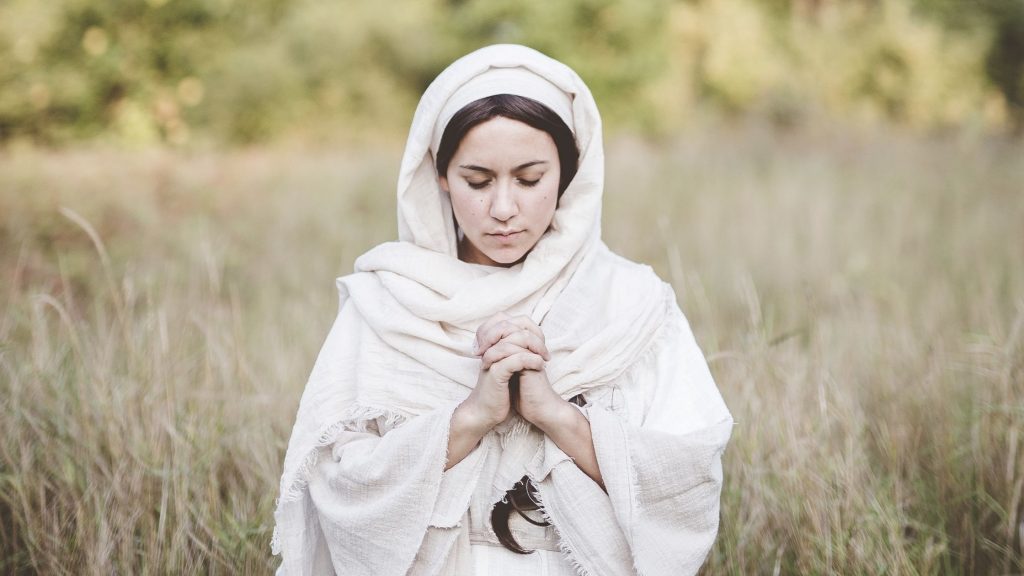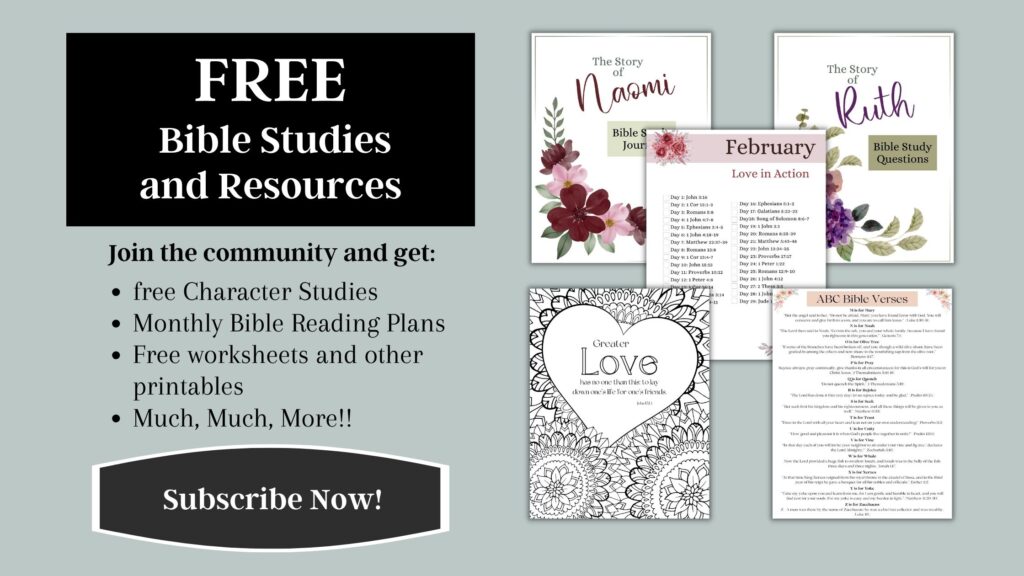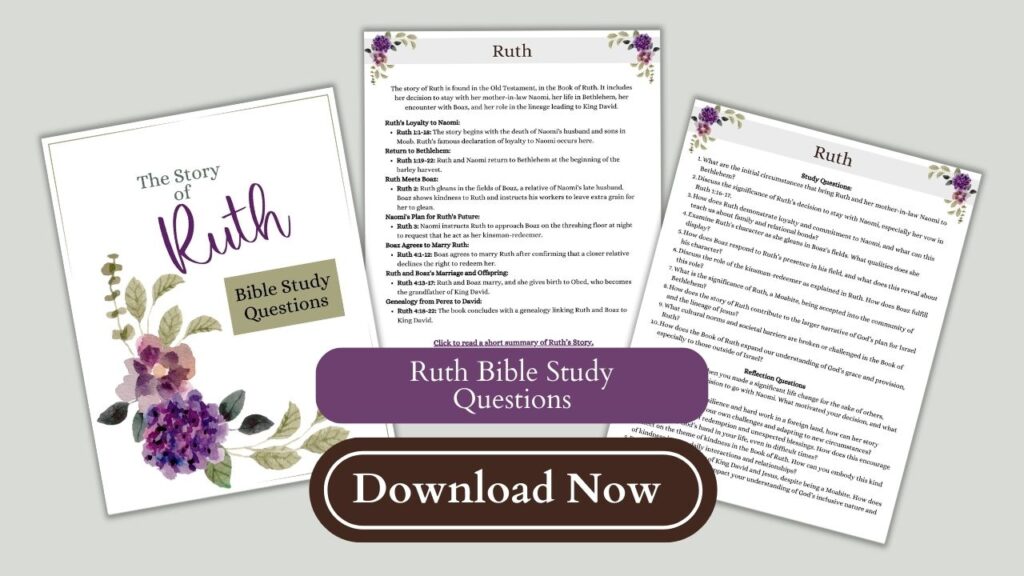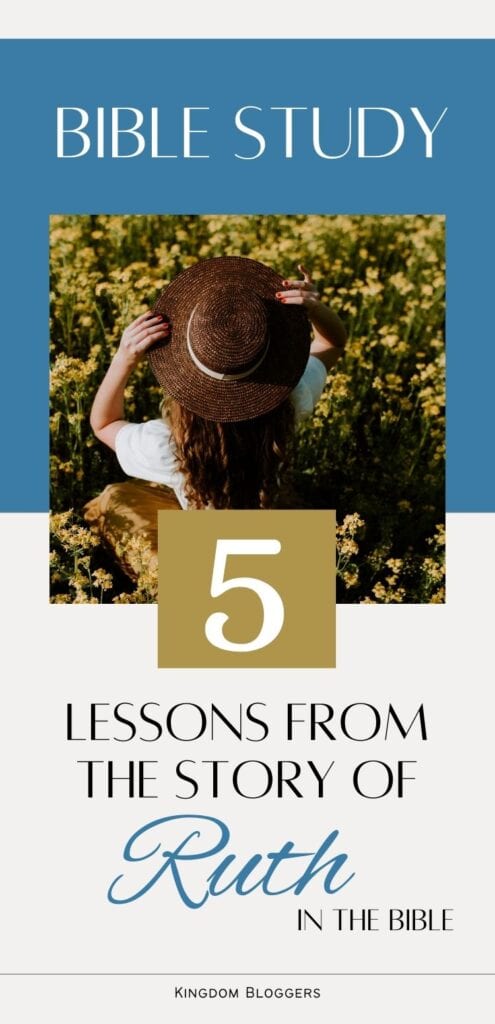The story of Ruth in the Bible is a powerful example of what it looks like to remain faithful to God and loyal to others. Ruth’s character was one of integrity, honesty, and a commitment to hard work.
But who was ruth in the Bible ? What was Ruth known for? What can Ruth’s story teach us?
Are you facing any troubling or challenging situations? Have you recently considered giving up or succumbing to despair?
If so, the Old Testament book of Ruth can encourage you. Ruth’s story is one of great courage and tenacity. When you face difficult circumstances, Ruth is an excellent example to follow.

This post may contain affiliate links. Read our full disclosure here.
The Story of Ruth in the Bible
Ruth’s story begins with a man named Elimelech. In the first chapter of Ruth, we learn that Elimelech lived during the time of the judges when there was no king in Israel.
He lived in Bethlehem (in Judah) and was married to a woman named Naomi. They had two sons, Mahlon and Chilion.
When a famine came upon the land, the family decided to travel to Moab and settle there. Naomi’s husband, Elimelech, died, and the two sons took wives from the women of Moab: Orpah and Ruth.
Naomi, her sons, and the two women lived in Moab for ten years. Sadly, in time, Naomi’s sons both died as well, leaving the women alone.
At the time, it was difficult for single women to provide for themselves in honorable ways without husbands to help them. Ruth’s situation was desperate.
Meanwhile, after the losses of her sons and her husband, Naomi heard that the Lord had visited her homeland and decided to return to Bethlehem in Judah.
Her daughter-in-law Orpah decided to stay in Moab; however, Ruth told her mother-in-law, Naomi, that she would follow her wherever she went.
When Naomi tried to convince Ruth to leave her and find a husband, Ruth replied, But Ruth replied, “Don’t urge me to leave you or to turn back from you. Where you go I will go, and where you stay I will stay. Your people will be my people and your God my God.” (Ruth 1:16, NIV).
Ruth had made up her mind. She would not return to the false gods of the Moabites or focus only on caring for her needs. Instead, she would seek work, care for Naomi, and continue to serve the God of Israel.
After returning to Naomi’s homeland, Bethlehem, Ruth worked hard to provide for the women. She followed the barley harvesters through the fields, gleaning the unpicked barley that was left by the reapers.
Meanwhile, a relative of Naomi’s late husband lived in Bethlehem. His name was Boaz, and he was wealthy, owning a great deal of land.
In his kindness, Boaz granted Ruth access to gather barley in his fields after his reapers gathered the harvest.
Boaz both protected and provided for Ruth as she continued in this work, and he proved himself to be an honorable man.
After experiencing this kindness in the fields of Boaz, Ruth and Naomi devised a plan.
As was the Jewish tradition of the time, when a woman was left as a young widow, a close male relative was granted the right to be her kinsman redeemer, redeeming her by marrying her. In this way, he could provide for the needs of his widowed family members.
Ruth decided that she would approach Boaz on his threshing floor to see if he would redeem her. If Boaz agreed to marry her, the women would be cared for throughout the remainder of their lives.
This might seem unusual in our current culture; however, the idea of a kinsman redeemer caring for widows was common at the time. But Boaz was a kind man.
When Ruth worked in Boaz’s field, he protected her and watched out for her. The women had deduced that he would make a suitable redeemer, protector, and provider.
Ruth followed the plan and approached Boaz on his threshing floor, making it clear that she was interested in being redeemed by him.
After ascertaining that no one else was contending to redeem Ruth, Boaz eagerly redeemed her, making her his wife.
He continued to provide for Ruth and Naomi throughout their lives, serving as a foreshadowing of the coming Christ, the Kinsman Redeemer of humankind.
Read more about 19 Praying Women of the Bible who literally changed the world!
Who Was Ruth in the Bible
In summary, Ruth was a Moabite woman of great character. She was faced with many difficult decisions and showed great courage by working hard and remaining loyal to her mother-in-law in a difficult time.
Ruth is also known as a woman of grace, honor, humility, and dignity. She won Boaz’s heart, securing a good future for herself and her mother-in-law, Naomi.
After Ruth and Boaz were married, they conceived a child named Obed. Obed later became the father of Jesse, and Jesse became the father of King David.
David was not only a great king in ancient Israel, but he was also a part of the royal bloodline through which Jesus Christ, the Messiah, was born.
What Kind of Woman Was Ruth
Today, we’ll take a closer look at the character of Ruth. Ruth was a virtuous woman who trusted in God’s plan.
She possessed character traits including loyalty, compassion, determination, wisdom, and kindness. After the death of her husband, she left her own people to go to a foreign land and care for Naomi.
Ruth sets a godly example for us to follow today when we deal with losses and setbacks of all sorts.
What Was Ruth Known For
Ruth was known for doing the right thing in all situations, possessing a strong work ethic, and carrying numerous strengths with her wherever she went.
Ruth’s example shows us how to live with character and honor God in difficult times. Ruth’s character was exceptional. Ruth’s love was faithful. She was truly a woman to emulate.
Let’s look at 12 characteristics portrayed through the life of Ruth.
Characteristics of Ruth
Ruth was a young woman of great character. We can apply the lessons we learn from Ruth to many aspects of our lives today.
This relatively little story nestled in the Old Testament is a story about God’s grace, commitment to family, and more. Let’s take a closer look at the character traits we see in Ruth.
Companionship
Ruth’s name in Scripture stems from a Hebrew word that means “companion” or “friend.” Ruth demonstrated the traits of devoted companionship and friendship when Naomi’s sons died and left all three women widows.
Ruth had great respect and deep love for Naomi. She committed to staying with Naomi, worshiping the One True God, and treating Naomi as her own family.
Ruth embodied the traits of companionship and friendship. We can follow her example by extending friendship to others when they go through difficult times. By sticking close to people who are hurting, we embody the love of Christ.
Faithfulness to God
When Naomi’s sons died, Orpah (Ruth’s sister-in-law) decided to stay in Moab and return to her Moabite gods.
Most likely, she aimed to find a Moabite man to marry and provide for her. She might have returned to her family of origin and sought refuge in their care.
We don’t know whether Ruth was tempted to return to her own family of origin. However, we see that she was committed to staying with Naomi and following the God of Israel. Ruth’s faithfulness to God is to be commended.
When life is difficult, many people blame God for their troubles.
Instead of turning to him for help and healing, they walk away. Ruth shows us what it looks like to remain faithful to the Lord in difficult times.

Loyalty
Perhaps more than any other trait, Ruth is known for her loyalty to Naomi.
Naomi did not want to be a burden to Ruth and even encouraged her to go and find another husband. However, Ruth made it clear that she would not leave Naomi.
As a result of her loyalty to Naomi, Ruth’s future was richly blessed. It is interesting to note that Boaz was a relative of Naomi’s deceased husband.
Had Ruth abandoned Naomi, she would not have met the wonderful man who became her provider.
Additionally, Ruth’s loyalty to Naomi led to the royal bloodline from which King David and even Jesus Christ, the Messiah, were born.
Compassion
In addition to loyalty, Ruth was compassionate toward Naomi. Distraught after the losses of her husband and sons, Naomi lamented that she should be called Mara (a word meaning, “bitter”) because she had become bitter after her great losses.
Most likely, Naomi was not always easy to live with during her grief.
Nevertheless, Ruth stayed close to her mother-in-law and extended compassion to her during the difficult time. This is a powerful example of how we should treat those who are difficult to deal with.
Grieving people can be tough to live with. When faced with these situations, we can follow Ruth’s example and extend compassion.
Perseverance
Ruth also demonstrated great perseverance. When her husband died and left her a young widow, Ruth didn’t give up. She didn’t sulk or decide to shrivel up and lose hope.
Instead, she looked for work. She continued helping Naomi. She didn’t quit when the going got tough.
When faced with discouraging situations, we can follow Ruth’s example and keep pressing forward. By repeatedly doing the “next thing” set before us, we continue moving forward in life.
Resilience
When life knocks us down, it can be tempting to stay on the ground. Resilience is the ability to bounce back after tough losses.
Ruth didn’t let the loss of her husband keep her down. She got back up and committed to continuing to follow God while aiming to provide for herself and Naomi.
When we get back up after life’s losses, we grow in strength. We can follow Ruth by being resilient amid life’s great losses and setbacks.
Women played such an important role in biblical history. Read more about them in our Women of the Bible series!
Respect
When Ruth entered Boaz’s field to glean the barley left by the reapers, she approached Boaz with respect and grace. Boaz was so impressed that he committed to making sure Ruth’s needs were met and ensuring that she was safe.
Ruth didn’t throw herself a pity party or appeal to Boaz in desperation. Instead, she presented herself with quiet strength and grace.
This quiet strength is the kind of spirit that commands respect.
Trust
Ruth trusted in God to provide for her. Most likely, she faced some troubled days as she considered how she would provide for herself after the loss of her husband.
The logical response to becoming a widow might have been to follow Orpha and search for a husband among the Moabites. However, by committing to staying with Naomi and following the Lord, Ruth expressed her trust in God.
Kindness
Ruth was kind to everyone she encountered. Her kindness was obviously displayed with Naomi.
Additionally, Ruth offered great kindness to Boaz and appeared to have a humble heart.
When we face difficult times, it can be tempting to be unkind because we feel anxious. Instead of responding to others with short tempers, we can follow Ruth’s example and extend kindness—even when we don’t feel like being kind.
Honor
We see Ruth’s honor through the way she gently approached Boaz at just the right time with the hope that he might become her kinsman redeemer. Boaz was most likely captivated by Ruth and eagerly redeemed her as his wife.
It is noteworthy that there was no seduction or sexual scandal when Ruth sat at the foot of Boaz’s bed. Ruth was a woman of honor.
When times are tough, we often face the temptation to take desperate measures in order to provide for our personal needs. In these times, it is important to remember that God honors integrity. When we do the right thing, we can trust that God will provide for our needs.
Hope
Ruth never lost hope. She eagerly expected that God would provide for her needs and help her as she aimed to help Naomi.
Hope looks to the future with expectation and confidence that God will provide. Ruth most likely faced some troubling moments of wrestling with God. However, she held onto hope that the God of Israel would guide her and care for her.
Grace
Ruth was a woman of grace. After Ruth’s husband died, she found favor with God because of this grace. God directed her path and provided for her.
Additionally, her grace led her into Boaz’s favor. He protected her as a worker in his fields and cared for her so much that he redeemed her and became her husband.

Lessons from the Story of Ruth
Ruth is the story of a woman who did not give up. She trusted that the God of Israel would guide and provide for her, and God did not let her down.
At times, we feel tempted to give up when life knocks us down. Ruth sets an excellent example for us. After the death of her husband, she did not give up. She continued trusting God and walking with him.
God rewarded her by providing her with a loving husband to care for her. Furthermore, she became an integral part of the bloodline of the future Messiah.
Let’s look at five moral lessons from the story of Ruth.
- As exemplified after the death of her husband, Ruth teaches us to keep pressing forward—and never give up—when life is tough.
- By committing to follow the God of Israel instead of returning to the Moabite gods, Ruth’s example teaches us to remain faithful to the Lord instead of trusting in our human strength.
- As exemplified in her commitment to Naomi, Ruth teaches us to remain faithful and loyal to those who cannot protect or provide for themselves.
- Regarding her willingness to work in Boaz’s fields, Ruth teaches us that God rewards hard work.
- Through her interactions with her future husband, Boaz, Ruth teaches us that when we do what is right, we will be found in favor with God and man.
Perhaps the great moral of the story of Ruth is that God blesses those who seek him wholeheartedly. When we follow God, he blesses us with many good things and abundant gifts.

It would have been easy for Ruth to return to her Moabite gods and forsake her mother-in-law.
However, Ruth honored God and loved Naomi well. In response, God blessed Ruth and provided for her in miraculous ways.
In the same way, when we do what is right—even when life is difficult—God’s blessings await us.
Like Ruth, we often need to patiently wait before we experience these blessings. Nevertheless, our God is a good Father, and he rewards those who follow hard after him.
Be sure to also read:
